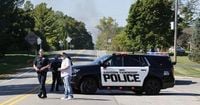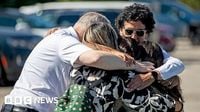In the aftermath of a devastating attack at The Church of Jesus Christ of Latter-day Saints in Grand Blanc Township, Michigan, an extraordinary act of compassion has emerged from the very community that was targeted. On Sunday, September 28, 2025, Thomas Jacob Sanford, a 40-year-old former Marine, drove his pickup truck through the church’s front doors during a worship service, opened fire on the congregation, and set the building ablaze. The attack left four people dead, at least eight others wounded, and the church itself destroyed. Sanford was killed by police at the scene, ending a rampage that lasted less than ten minutes but left deep scars on countless lives.
In the days that followed, the pain and confusion rippled far beyond the immediate victims. For the Sanford family—his wife, children, and relatives—the tragedy was compounded by grief, fear, and the looming threat of financial hardship. According to Katie Hamilton, Sanford’s sister, the family was “grief stricken, overwhelmed with guilt, fear and the deep sadness of a family trying to reckon with the actions of a son, brother and husband they now need to bury.” She described the aftermath as a “nightmare,” with Sanford’s widow and child forced to move for their own safety after facing harassment.
Yet, in a twist that has stunned many, it was members of the very faith that Sanford attacked who stepped forward to offer support—not just to the victims, but to the gunman’s family as well. David Butler, a Utah-based writer and lifelong member of The Church of Jesus Christ of Latter-day Saints, watched the news coverage in disbelief. “We understand that there is a family that needs to be taken care of,” he told the Associated Press. Moved by the teachings of his faith—particularly the Christian ideals of forgiveness and caring for the afflicted—Butler set up an online fundraiser for the Sanford family on the platform GiveSendGo the Tuesday after the attack.
Butler, who has no personal connection to Sanford’s family or the Grand Blanc community, said his initial goal was modest: $10,000 to help the family get through the next few months. “It’s fairly predictable; it’s not an exotic answer: You mourn with those who mourn, you turn the other cheek, you take care of the widows and the orphans,” he explained to the Detroit Free Press. Yet within 48 hours, the response was overwhelming—over 7,000 people contributed, and the total soared past $275,000, eventually approaching $300,000 by Thursday, October 2, 2025. Many donors identified themselves as Latter-day Saints, leaving messages of love and support. “Another Latter-Day Saint here, praying for this family to feel loved and supported during these challenging times,” wrote one anonymous contributor.
The outpouring of generosity was not lost on the Sanford family. Initially, Katie Hamilton was suspicious—she feared the fundraiser might be a scam or another attempt to vilify her family. But as she read through the hundreds of heartfelt comments, her skepticism melted away. “It took my breath away, that this church is so forgiving and understanding and caring and their first thing was to worry about the family that was left behind,” she said through tears. “It was the grace of the Lord. I have no words, I can’t express to you; it was the forgiveness that they did. It was the forgiveness and the caring and the wrapping their arms around our family, too. They didn’t forget about us.”
The GiveSendGo page explained that Sanford’s family faced not only emotional trauma but also financial burdens, especially as one of Sanford’s sons requires ongoing specialized medical care due to a rare disease called congenital hyperinsulinism. “On top of that, one of the Sanford sons deals with serious medical challenges that require ongoing care, treatment, and specialized support,” the fundraiser stated. Prior attempts to raise money for his care had met with limited success.
The act of raising money for the family of a perpetrator is unusual and, unsurprisingly, has drawn criticism online. Some have questioned why the focus would shift from the victims to the family of the attacker. But for many within the Latter-day Saints community, the gesture is rooted in deeply held beliefs about forgiveness and compassion. As Patrick Mason, a professor of Mormon history at Utah State University, told the Detroit Free Press, “This is a beautiful example of a religious community living up to its best ideals and saying, ‘How do we respond to something really negative? We try to replace that darkness with light. We try to replace that hate with love.’”
Butler echoed this sentiment, noting that the response was not just from Mormons but from people of many backgrounds. “Does that say beautiful things about Mormons? You bet your ass it does. Does it say beautiful things about the many non-Mormons who’ve contributed? Absolutely,” he said. Messages left by donors often cited religious teachings, such as, “I promise that as you forgive, the Savior will relieve you of anger, resentment and pain. The Prince of Peace will bring you peace.”
Meanwhile, the broader community has rallied around the victims and their families. Multiple online fundraisers have been established for those directly affected by the shooting, and GoFundMe launched a verified hub to organize these efforts. Vigils have been held, flags lowered across Michigan, and neighbors—including those from other denominations—have come together to honor the victims and offer support.
Authorities continue to investigate Sanford’s motive, though officials, including the FBI director and the White House press secretary, have indicated that Sanford was “an individual who hated people of the Mormon faith.” Friends and family have described his long-standing struggles, including possible post-traumatic stress disorder after serving as a Marine in Iraq, and a period of animosity toward the Mormon faith following a breakup with a woman in Utah who was a member of the church. Yet, as his sister Katie Hamilton admitted, “We, as a family, don’t have an answer. And that’s probably the hardest thing about this right now, because we don’t know. We don’t know what happened. We don’t know what experiences that he had up there.”
For survivors, the journey toward healing is just beginning. Lisa Louis, who lost her father in the attack, wrote in a letter shared with CBS News, “I forgave him, I forgave him right there, not in words, but with my heart.” The sentiment of forgiveness—so central to the church’s response—has become a guiding principle for many as they grapple with the tragedy.
As the Sanford family faces the daunting task of rebuilding their lives, they do so buoyed by an unexpected wave of compassion from those they might have least expected. For Butler and thousands of others, the fundraiser has become more than just a financial lifeline; it is a testament to the power of forgiveness and the enduring strength of community in the face of senseless violence.

